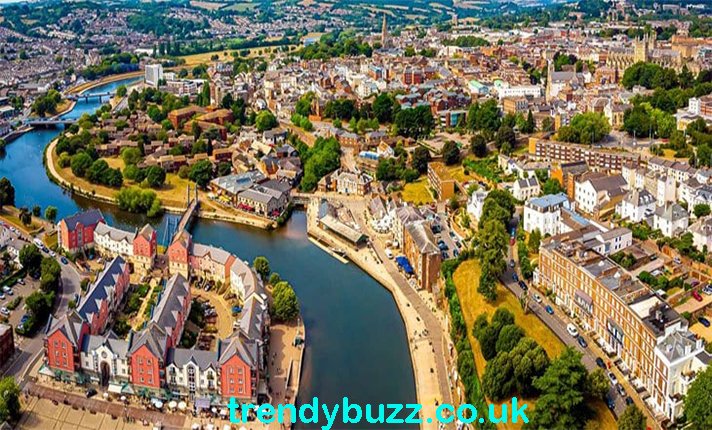Exeter wears its history lightly: ancient stonework rubbing shoulders with indie cafés, a medieval cathedral looking down on busy shopping streets, and a riverside quay that still hums with life. Compact and walkable, it’s the sort of place that rewards curiosity — turn a corner and you’ll find a secret courtyard, an artisan bakery, or a museum with a story to tell.
History written in the streets
Exeter’s past is visible everywhere. The city grew from a Roman fortress into a medieval market hub and later adapted to the needs of trade and industry; its compact centre still preserves layers of that story. Wander through the high street and you’ll pass buildings whose facades hide centuries of change: Tudor timber frames, Georgian proportions, Victorian shopfronts, all threaded together by lanes that predate the motorcar. That long narrative — and how it’s been repurposed for modern life — is part of the city’s charm.
The cathedral: Devon’s architectural heartbeat
No introduction to Exeter is complete without Exeter Cathedral. Dominating the skyline, its Gothic vaults and medieval misericords are not just photo opportunities but active parts of civic life: choir concerts, community events, quiet moments of reflection. The cathedral’s presence gives the city a sense of continuity — a living building that links present-day Exeter to the people who built and shaped it across centuries. If you only have time for one visit, a guided tour will bring the craftsmanship and the quirky historical details to life.
Quayside: water, warehouses and weekend life
The River Exe and its Quayside were once the arteries of the city’s trade; today the quay is a laid-back hub of cafes, pubs, galleries and outdoor events. The transformation from working port to leisure-focused riverfront didn’t erase the past — old warehouses and stone revetments remain — but it did give Exeter one of its most sociable neighbourhoods. Boats bob on the water, market stalls appear in summer, and street musicians often provide the soundtrack for a slow afternoon of people-watching. It’s a favourite both for families and for anyone who enjoys a waterside stroll.
RAMM and the cultural pulse
The Royal Albert Memorial Museum (RAMM) is a jewel in Exeter’s cultural crown: an encyclopedic museum and art gallery with rotating exhibitions, family programs and collections that range from archaeology to natural history and contemporary art. RAMM’s approachable displays and events make it a must for first-time visitors and locals alike, and it showcases how Exeter balances academic seriousness with accessible storytelling. Whether you’re keen on fossils, fine art, or community-curated exhibits, RAMM usually has something to surprise you.
Food, markets and independent spirit
Exeter’s food scene blends Devon’s agricultural bounty with cosmopolitan influences. From pubs pouring local ales to restaurants focused on seasonal produce, there’s a steady movement toward independent suppliers and artisan producers. Farmer’s markets, small-batch bakers and specialty coffee shops mean that eating well in Exeter needn’t cost the Earth — and part of the pleasure is discovering a new favourite at a market stall or a tucked-away terrace. The student population also adds energy and variety to the evening scene, keeping things affordable and experimental.
Festivals, music and community events
Across the year Exeter stages events that bring the compact city centre to life: music nights, food festivals, heritage open days and outdoor cinema screenings. These local festivals are particularly good at knitting community and visitor experiences together, with small venues and public spaces used imaginatively. For visitors, checking a local events calendar before you travel can reveal pop-up markets, late-night museum openings, or free concerts that are the sort of authentic moments you won’t find in a brochure.
Getting around and day trips
Because Exeter is compact, getting around is mostly a matter of walking or catching a short bus ride. The city’s train station connects to larger cities and makes Exeter a convenient base for exploring Devon: Dartmoor’s tors and walking trails, the Jurassic Coast’s dramatic cliffs, and quaint coastal towns are all within easy reach for a day trip. That geographic convenience — countryside and coast close at hand — explains why many visitors use Exeter as their South West hub.
Final thought: a city both small and surprising
“This is Exeter” is both a slogan and an invitation. The city is small enough to feel intimate but rich enough to reward multiple visits. It’s a place where history is present but unpretentious, where creative energy and civic pride meet a generous helping of riverside calm. Whether you’re there for a long weekend or just a few hours between trains, let the city’s lanes and local recommendations steer you — some of the best experiences happen when you follow where the locals go.
